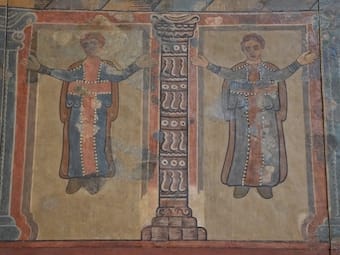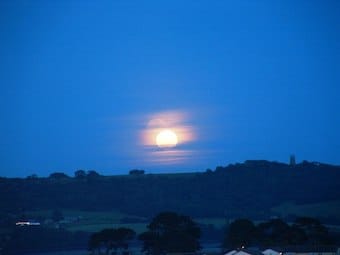Two praying figures from Lullingstone Roman Villa in Kent. Built in the 1st century AD, early in the Roman conquest of Britain, the villa was repeatedly remodelled and extended until the fourth century. During that time, the owners dropped their Roman paganism and became Christians, setting aside a room for a small chapel decorated with these wonderfully preserved frescos. In churches to this day, the deacon still commemorates the living and the dead just after the consecration of the bread and wine, praying that God will grant them rest “where the light of Thy countenance shall visit them”. See For the Departed.
“I KNOW nothing of such arts” protested Imma. “But my brother Tunna is a priest,* and no doubt he thinks I am dead, and prays for my soul during mass. And were I now in that better place above,” he added thoughtfully, “the bonds upon my soul would be dissolved by his prayers just like this.”*
It was becoming clear that Imma was no peasant, and Ecgfrith promised to spare his life in return for the truth. When he heard he had been nursing a Mercian viper, he looked like thunder but kept his word, and sold Imma to a Frisian in London, then within the Kingdom of Kent. This Frisian, however, found that neither rope nor chain would hold this uncanny slave, especially in the mornings around nine; so when Hlothere, King of Kent, whose aunt Queen Ethelthryth had once employed Imma in her retinue, offered to buy Imma’s freedom, the deal was quickly done.
Later, Tunna explained to Imma that he had mistaken a mangled corpse on the battlefield for him, and said many prayers for the poor wretch’s soul during mass. “When was this?” asked Imma, suddenly. “Every morning,” replied Tunna. “Around nine.”
* Bede tells us that Tunna was a priest and the Abbot of a monastery in a place that he tells us (writing in Latin) was subsequently named Tunnacestir. The location remains unknown. The port of Immingham in Lincolnshire, whose name means ‘homestead of the people of Imma’, may possibly be connected with Ethelred’s thegn.
* The word Bede uses is poena, meaning punishment, torment or pain. If we believe as Bede did that Imma’s experience should teach us about prayer for the dead, then it follows that this ‘painful torment’ is best thought of as some kind of metaphorical fetters, a maddening, chafing hindrance to heaven, just when heaven is in sight. “I wear the chain I forged in life,” lamented Jacob Marley in Charles Dickens’s A Christmas Carol, “I made it link by link, and yard by yard; I girded it on of my own free will, and of my own free will I wore it.” Bede’s purpose in telling this story is to reassure his readers that prayer can break the bonds of this chain, even on behalf of other people, whether living or dead. See Hebrews 2:14-15. See also There is No Liberty without Self-Control.
Précis
On learning that Imma was really a high-value enemy, the Northumbrian king sold him as a slave to London. His new master still could not keep Imma bound, so he allowed Imma’s friends to buy his freedom. Then Imma discovered that his bonds had fallen off whenever his brother Tunna, who thought he was dead, prayed for him during mass. (60 / 60 words)
On learning that Imma was really a high-value enemy, the Northumbrian king sold him as a slave to London. His new master still could not keep Imma bound, so he allowed Imma’s friends to buy his freedom. Then Imma discovered that his bonds had fallen off whenever his brother Tunna, who thought he was dead, prayed for him during mass.
Variations: 1.increase the length of this precis to exactly 65 words. 2.reduce the length of this precis to exactly 55 words. 3.introduce one of the following words into the precis: because, if, may, since, unless, until, whereas, whether.
Archive
Word Games
Jigsaws Based on this passage
Express the ideas below in a single sentence, using different words as much as possible. Do not be satisfied with the first answer you think of; think of several, and choose the best.
Spinners Find in Think and Speak
For each group of words, compose a sentence that uses all three. You can use any form of the word: for example, cat → cats, go → went, or quick → quickly, though neigh → neighbour is stretching it a bit.
This exercise uses words found in the accompanying passage.
1 Family. Knot. Sudden.
2 Enough. Poor. They.
3 Better. Leave. Morning.
Variations: 1. include direct and indirect speech 2. include one or more of these words: although, because, despite, either/or, if, unless, until, when, whether, which, who 3. use negatives (not, isn’t, neither/nor, never, nobody etc.)
Homonyms Find in Think and Speak
Each of the words below has more than one possible meaning. Compose your own sentences to show what those different meanings are.
This exercise uses words found in the accompanying passage.
1. Just. 2. Tie. 3. Keep. 4. Man. 5. Check. 6. Hold. 7. Found. 8. Well. 9. Order.
Add Vowels Find in Think and Speak
Make words by adding vowels to each group of consonants below. You may add as many vowels as you like before, between or after the consonants, but you may not add any consonants or change the order of those you have been given. See if you can beat our target of common words.
r (16+3)
air. are. area. aria. aura. ear. eerie. era. ere. euro. oar. or. ore. our. roe. rue.
er. ire. re.
Post Box : Help Available
You are welcome to share your creativity with me, or ask for help with any of the exercises on Clay Lane. Write to me at this address:
See more at Post Box.
If you like what I’m doing here on Clay Lane, from time to time you could buy me a coffee.
Buy Me a Coffee is a crowdfunding website, used by over a million people. It is designed to help content creators like me make a living from their work. ‘Buy Me a Coffee’ prides itself on its security, and there is no need to register.
Related Posts
One week into a Lenten retreat with the Bishop of Hexham, a boy’s miserable life is turned right around.
Picture: © David Dixon, Geograph. Licence: CC BY-SA 2.0.. Source.
Posted October 4 2017
The earliest Christians longed to celebrate the resurrection together at Passover, but that was not as easy as it sounds.
Picture: © Darren Rosson, Geograph. Licence: CC-BY-SA 2.0.. Source.
Posted May 17 2017
When Penda tried to burn down Bamburgh Castle, St Aidan turned the pagan King’s own weapons against him.
Picture: © David White, Wikimedia Commons. Licence: CC-BY-SA 2.0.. Source.
Posted March 20 2016
Forced from his throne and threatened with murder, Edwin makes a curious bargain for his deliverance.
Picture: © Paul Buckingham, Geograph. Licence: CC BY-SA 2.0.. Source.
Posted March 8 2016






